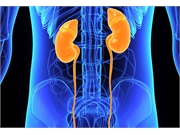Data scant on exposure to gadolinium-based contrast agents for those with acute kidney injury, risk for CKD
TUESDAY, June 23, 2020 (HealthDay News) — The occurrence of nephrogenic systemic fibrosis (NSF) appears to be rare after exposure to newer gadolinium-based contrast agents (GBCA), according to a review published online June 23 in the Annals of Internal Medicine.
Joseph Lunyera, M.B.Ch.B., from the Duke University School of Medicine in Durham, North Carolina, and colleagues synthesized evidence about NSF risk with newer versus older GBCAs. Twenty studies assessed NSF risk after exposure to newer GBCAs and 12 compared risk between newer and older GBCAs.
The researchers found no cases of NSF developed among 83,291 patients exposed to newer GBCAs. In the 12 studies that compared risk for newer and older GBCAs, with 118,844 patients, 37 NSF cases developed after exposure to older GBCAs, while there were four cases (three confounded) after exposure to newer GBCAs. For patients with acute kidney injury or those at risk for chronic kidney disease (CKD), data were scant.
“The occurrence of NSF after exposure to newer linear or macrocyclic GBCAs was very rare,” the authors write. “However, considering the scarcity of data about the use of newer and seemingly safer GBCAs among patients with advanced CKD, CKD risk factors, or acute kidney injury, further investigations in these populations are warranted.”
Copyright © 2020 HealthDay. All rights reserved.








